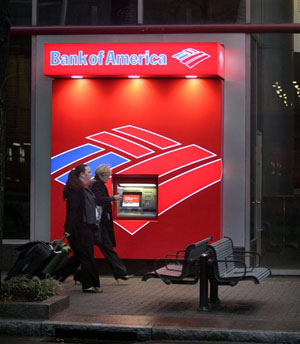April Job-Loss Data Offset Fears Over Bank Stress Test
Stock futures reversed an early decline and moved higher Wednesday following data indicating job losses slowed in April.
Stock futures had been lower in early trading on worries that banks may need more capital than previously thought.
But the market got a lift from the ADP National Employment Report, an unofficial gauge that stock traders have been increasingly monitoring as U.S. job losses mount. The report said private sector employment fell by 491,000 in April, much better than ADP’s report last month that said 708,000 jobs were lost in March.
The report also said employment is likely to decline for several more months, but at a slower rate. The news was a reassuring sign ahead of the Labor Department’s Friday report on job losses, and offered further validation that the economy’s slide is moderating.
Confidence has been increasing on Wall Street amid improving economic data. In recent weeks, investors have even been able to look past mixed earnings reports, fears about a possible swine flu pandemic and a bankruptcy filing from one of the country’s largest automakers, Chrysler LLC, and send the market higher. The buying has driven the market up more than 25 percent from 12-year lows in early March.
But despite the good news on the job sector Wednesday, many hurdles remain. Investors are still worried about the results of the bank stress tests, which could show that the banking industry is in worse shape than expected.
“This obviously is lifting the spirits of the market at this time,” Peter Cardillo, chief market economist at Avalon Partners, said of the ADP report. “But we have to get through the stress tests and the jobs report on Friday.”
Ahead of the market’s open, Dow Jones industrial average futures rose 63, or 0.8 percent, to 8,445, after earlier falling as much as 95 points. Standard & Poor’s 500 index futures rose 7.50, or 0.8 percent, to 910.90, while Nasdaq 100 index futures rose 4.25, or 0.3 percent, to 1,431.50.
There has been much speculation about which banks are most in need of more cash. Bank of America Corp., Citigroup Inc. and Wells Fargo & Co. are among those reportedly in that group.
On Wednesday, The New York Times reported federal regulators have warned Bank of America Corp. it will need to raise about $34 billion — more than most expectations. The Wall Street Journal had a similar report. Bank of America was not immediately available to comment.
The reports initially sent futures lower on Wednesday. The reports due Thursday could upset Wall Street, but some analysts say the stress tests have already been factored into the market.
Financial stocks have been the driving force of the market’s stunning two-month advance, which was touched off by big bank CEOs who said business was improving. Those words were validated by the better-than-expected earnings reports from the country’s largest banks. But despite the improving results, loan losses continue to mount, worrying investors.
A healthy banking industry is vital for economic recovery; Consumers and businesses need loans to keep the economy moving. The government has spent hundreds of billions of dollars to get banks, which have been saddled with massive loan losses as a result of the recession, back on their feet and lending again.
Stocks on Tuesday gave back few of the big gains logged the previous day, when the Standard & Poor’s 500 index jumped into the black for the year. Buying had been stoked by positive news on the housing industry and extended a rally that has brought stocks up from 12-year lows in early March. On Tuesday, the Dow closed down 16 points, while the S&P 500 index slipped about 3 points.
Bond prices were higher early Wednesday. The yield on the benchmark 10-year Treasury note, which moves opposite its price, dipped to 3.16 percent from 3.17 percent late Tuesday.
The dollar was mixed against other major currencies, while gold prices rose.
Light, sweet crude rose 37 cents to $54.21 in electronic trading on the New York Mercantile Exchange.
Overseas, Hong Kong’s Hang Seng index rose 2.5 percent. In afternoon trading, Britain’s FTSE 100 was up 0.5 percent, Germany’s DAX index was down 0.2 percent, and France’s CAC-40 was up 0.6 percent. Markets in Japan were closed for a holiday.
5/6/2009 9:10 AM SARA LEPRO AP Business Writer NEW YORK


